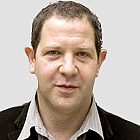 This article was first published in the Independent
This article was first published in the Independent
I first met Art Troitsky in 1985. I was a trainee journalist for Reuters, thrown into the maelstrom of spy swaps, Chernobyl and a Russia tentatively coming out of deep freeze. A rock promoter and talk of the town, he had been putting on bands even in Brezhnev’s time. He knew everyone and, vitally, he knew how far he could go.
By the early 1990s, as the Communist system collapsed, the coast was clear for creative talent to push the boundaries. I remember going with Troitsky to a rave he was organising at the Exhibition of Economic Achievements. He had his own after-midnight chat show on NTV, the then outspoken station.
Three years ago I was with Art on the set of state television. It was the live screening of the Eurovision song contest from Belgrade, with comments from the Moscow audience during breaks.
The Russian singer won — a ridiculous balladeer on ice skates. Amid the celebrations (including a woman who attributed the victory to the inspiration of Vladimir Putin), Troitsky was asked to comment. He said he thought the performance was an embarrassment. He kept going with his attacks, as the other celebs, in their designer suits and furs, shouted “shame on you”.
This is Putin’s Russia – where the pursuit of wealth trumps the pursuit of civil liberties, and where the odd remaining voice of criticism is hounded. As we were driving back from the television station, Troitsky received a number of calls from friends on his mobile. They praised him for his bravery, but suggested that he should be careful.
Now they have – finally – come after him. To use a favourite Russian phrase, these four cases cannot be coincidental. The strong view among Troitsky’s colleagues is that Putin’s people are sending the same signal to the cultural community that they sent nearly a decade ago to the business world. Don’t mess with us, and we won’t mess with you. Mikhail Khodorkovsky, the former head of the Yukos oil firm, languishes in jail, his original eight year sentence increased by six more. Since then the oligarchs have done what Putin has asked of them.
The difference with Troitsky is that, while he is well known and popular, he is neither rich, nor powerful nor political. Nor is he an investigative journalist, such as Anna Politkovskaya, who was murdered by forces who had tired of her truth-telling. Her fate and that of many others led the Committee to Protect Journalists to rank Russia the fourth most dangerous country in the world for reporters to operate.
Troitsky’s “crime” is much more mundane: humour and irreverence. It can only be hoped that the judges hearing his cases – and taking their instructions from on high – will think again. And what about President Dmitry Medvedev? A long time fan of rock music, he hosted Deep Purple for tea in his residence two months ago. Will he shrug his shoulders, as is his wont, as free speech suffers yet another setback in Russia?
John Kampfner is Chief Executive of Index on Censorship and author of ‘Freedom for Sale’




